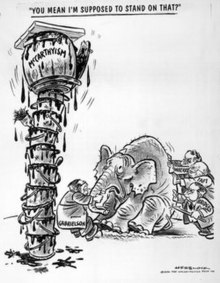Herblock: Difference between revisions
RichardKatz (talk | contribs) Credit Herblock with the term Multiple Bad Things Effect |
RichardKatz (talk | contribs) mNo edit summary |
||
| Line 28: | Line 28: | ||
Herblock vigorously attacked the political abuses and scandals of the [[Richard M. Nixon|Nixon Administration]] and won his third Pulitzer Prize in 1979. Nixon canceled his subscription to the ''Post'' after Herblock drew him crawling out of a sewer. |
Herblock vigorously attacked the political abuses and scandals of the [[Richard M. Nixon|Nixon Administration]] and won his third Pulitzer Prize in 1979. Nixon canceled his subscription to the ''Post'' after Herblock drew him crawling out of a sewer. |
||
Herblock |
Also in the 1970s, Herblock noticed that in the relationship between critics of Nixon and the public, that President Nixon often benefited from a phenomena he called "for want of a better term" the "Multiple Bad Things Advantage." He describes the term in his 1974 book [[Herblock Special Report]]: "There was so much to focus on" that it appeared to the outside world as if Nixon's critics were "inarticulate" or simply "disliked" Nixon for reasons "they could not tell."" This idea was late adapted by conservative columnist Charles Krauthammer re-engineered into the cynical mockery of critics of President [[George W. Bush]] known as "[[BDS]]." |
||
In 1986, Block received the [[Elijah P. Lovejoy|Elijah Parish Lovejoy]] Award as well as an honorary [[Doctor of Laws]] degree from [[Colby College]]. |
In 1986, Block received the [[Elijah P. Lovejoy|Elijah Parish Lovejoy]] Award as well as an honorary [[Doctor of Laws]] degree from [[Colby College]]. |
||
Revision as of 01:09, 1 June 2009
| Herblock | |
|---|---|
 Herblock coined the term "McCarthyism" in this cartoon in the March 29, 1950 Washington Post | |
| Nationality | American |
| Area(s) | Cartoonist |
Notable works | editorial cartoons |
Herbert Lawrence Block, commonly known as Herblock (October 13, 1909 – October 7, 2001), was an American editorial cartoonist and author.
During the course of his long career, he won three Pulitzer Prizes (1942, 1954, 1979), the Presidential Medal of Freedom (1994), the National Cartoonist Society Editorial Cartoon Award in 1957 and 1960, the Reuben Award in 1956, and the Gold Key Award (the National Cartoonists Society Hall of Fame) in 1979.
His first cartoon appeared in the Chicago Daily News on April 24,1929. It advocated for the conservation of America's forests. After working (1933–43) for the Newspaper Enterprise Association, in 1946 he joined the Washington Post, from which he never retired. His personal assistant for 44 years was Jean Rickard, now Executive Director of the Herb Block Foundation. Herblock's last cartoon was published on August 26, 2001. He died of pneumonia just six weeks later, at the age of 91.
During the 1930s, his own political views had become more liberal and he favored Franklin D. Roosevelt and the New Deal. He pointed out the dangers of Soviet aggression, the growing Nazi menace, and opposed American isolationists. In 1942, he won the Pulitzer Prize for the first time. He joined the Washington Post after serving in the military during World War II.
In the early 1950s, Senator Joseph McCarthy was one of his recurring targets, for whom Herblock coined the term "McCarthyism" in a particular cartoon in 1950. He won a second Pulitzer Prize in 1954.
Herblock vigorously attacked the political abuses and scandals of the Nixon Administration and won his third Pulitzer Prize in 1979. Nixon canceled his subscription to the Post after Herblock drew him crawling out of a sewer.
Also in the 1970s, Herblock noticed that in the relationship between critics of Nixon and the public, that President Nixon often benefited from a phenomena he called "for want of a better term" the "Multiple Bad Things Advantage." He describes the term in his 1974 book Herblock Special Report: "There was so much to focus on" that it appeared to the outside world as if Nixon's critics were "inarticulate" or simply "disliked" Nixon for reasons "they could not tell."" This idea was late adapted by conservative columnist Charles Krauthammer re-engineered into the cynical mockery of critics of President George W. Bush known as "BDS."
In 1986, Block received the Elijah Parish Lovejoy Award as well as an honorary Doctor of Laws degree from Colby College.
In 2008 Herblock's work was the subject of an exhibition entitled Herblock's Presidents at the Smithsonian Institution's National Portrait Gallery (United States) .[1]
Books of collected cartoons by Herbert Block
- Herblock's history: political cartoons from the crash to the millennium. Library of Congress, 2000.
- Herblock: a cartoonist's life. Maxwell Macmillan International, 1993.
- Herblock at large: "Let's go back a little ..." and other cartoons with commentary Pantheon Books, 1987.
- Herblock through the looking glass Norton, 1984.
- Herblock on all fronts: text and cartoons New American Library, 1980
- Herblock special report Norton, 1974
- Herblock's state of the Union. Simon and Schuster, (1972)
- The Herblock gallery. Simon and Schuster, (1968)
- Straight Herblock. Simon and Schuster (1964)
- Herblock's special for today. Simon and Schuster, (1958).
- Herblock's here and now. Simon and Schuster, (1955).
- The Herblock book (1952)
- Herblock looks at Communism [1950?]
References
This article includes a list of references, related reading, or external links, but its sources remain unclear because it lacks inline citations. (September 2008) |
External links
- Many of Herblock's works can be found at the Library of Congress
- Enduring Outrage: Editorial Cartoons by Herblock (online exhibition from the Library of Congress)
- The Herb Block Foundation
- Herblock obituary at New York Times
{{subst:#if:Herblock|}} [[Category:{{subst:#switch:{{subst:uc:1909}}
|| UNKNOWN | MISSING = Year of birth missing {{subst:#switch:{{subst:uc:2001}}||LIVING=(living people)}}
| #default = 1909 births
}}]] {{subst:#switch:{{subst:uc:2001}}
|| LIVING = | MISSING = | UNKNOWN = | #default =
}}
